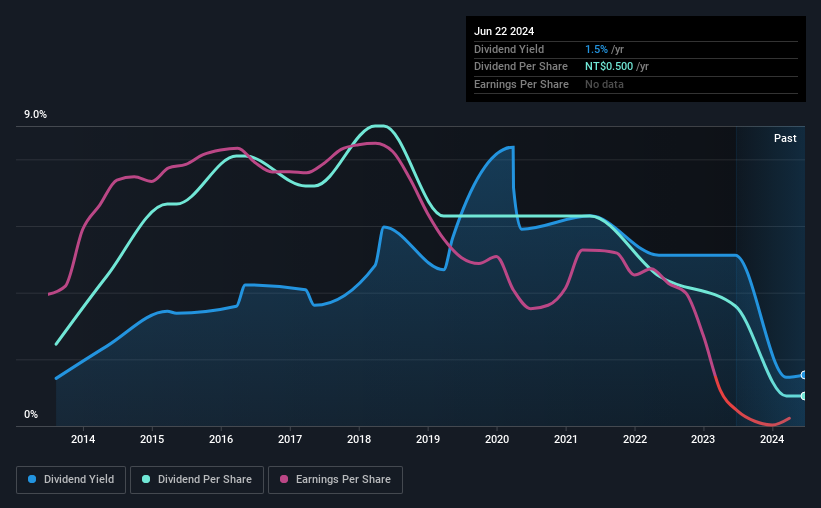- Taiwan
- /
- Auto Components
- /
- TWSE:1338
Hiroca Holdings (TWSE:1338) Is Paying Out Less In Dividends Than Last Year
Hiroca Holdings Ltd. (TWSE:1338) has announced that on 2nd of August, it will be paying a dividend ofNT$0.50, which a reduction from last year's comparable dividend. This payment takes the dividend yield to 1.5%, which only provides a modest boost to overall returns.
View our latest analysis for Hiroca Holdings
Hiroca Holdings Might Find It Hard To Continue The Dividend
While yield is important, another factor to consider about a company's dividend is whether the current payout levels are feasible. While Hiroca Holdings is not profitable, it is paying out less than 75% of its free cash flow, which means that there is plenty left over for reinvestment into the business. In general, cash flows are more important than the more traditional measures of profit so we feel pretty comfortable with the dividend at this level.
Looking forward, earnings per share could fall by 38.9% over the next year if the trend of the last few years can't be broken. While this means that the company will be unprofitable, we generally believe cash flows are more important, and the current cash payout ratio is quite healthy, which gives us comfort.

Dividend Volatility
Although the company has a long dividend history, it has been cut at least once in the last 10 years. The dividend has gone from an annual total of NT$1.36 in 2014 to the most recent total annual payment of NT$0.50. The dividend has shrunk at around 9.5% a year during that period. A company that decreases its dividend over time generally isn't what we are looking for.
Dividend Growth Potential Is Shaky
With a relatively unstable dividend, and a poor history of shrinking dividends, it's even more important to see if EPS is growing. Hiroca Holdings' earnings per share has shrunk at 39% a year over the past five years. A sharp decline in earnings per share is not great from from a dividend perspective. Even conservative payout ratios can come under pressure if earnings fall far enough.
The Dividend Could Prove To Be Unreliable
In summary, dividends being cut isn't ideal, however it can bring the payment into a more sustainable range. The payments haven't been particularly stable and we don't see huge growth potential, but with the dividend well covered by cash flows it could prove to be reliable over the short term. Overall, we don't think this company has the makings of a good income stock.
Companies possessing a stable dividend policy will likely enjoy greater investor interest than those suffering from a more inconsistent approach. Still, investors need to consider a host of other factors, apart from dividend payments, when analysing a company. For example, we've identified 2 warning signs for Hiroca Holdings (1 is a bit unpleasant!) that you should be aware of before investing. If you are a dividend investor, you might also want to look at our curated list of high yield dividend stocks.
Valuation is complex, but we're here to simplify it.
Discover if Hiroca Holdings might be undervalued or overvalued with our detailed analysis, featuring fair value estimates, potential risks, dividends, insider trades, and its financial condition.
Access Free AnalysisHave feedback on this article? Concerned about the content? Get in touch with us directly. Alternatively, email editorial-team (at) simplywallst.com.
This article by Simply Wall St is general in nature. We provide commentary based on historical data and analyst forecasts only using an unbiased methodology and our articles are not intended to be financial advice. It does not constitute a recommendation to buy or sell any stock, and does not take account of your objectives, or your financial situation. We aim to bring you long-term focused analysis driven by fundamental data. Note that our analysis may not factor in the latest price-sensitive company announcements or qualitative material. Simply Wall St has no position in any stocks mentioned.
Have feedback on this article? Concerned about the content? Get in touch with us directly. Alternatively, email editorial-team@simplywallst.com
About TWSE:1338
Hiroca Holdings
Produces and sells various automotive trims, electronic plastic parts, plastic hollow crates, and molds in China, the United States, and internationally.
Mediocre balance sheet with low risk.
Market Insights
Community Narratives


Recently Updated Narratives


MINISO's fair value is projected at 26.69 with an anticipated PE ratio shift of 20x


The Quiet Giant That Became AI’s Power Grid


Nova Ljubljanska Banka d.d will expect a 11.2% revenue boost driving future growth
Popular Narratives


The company that turned a verb into a global necessity and basically runs the modern internet, digital ads, smartphones, maps, and AI.


MicroVision will explode future revenue by 380.37% with a vision towards success



